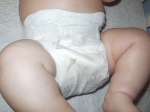UK News
-
 British men charged with assisting Russian intelligence in suspected arson case
Two British men, Dylan Earl, 20, from Elmesthorpe in Leicestershire, and Jake Reeves, 22, from Croydon, have been charged with aiding Russian intelligence following a suspected arson attackRead More...
British men charged with assisting Russian intelligence in suspected arson case
Two British men, Dylan Earl, 20, from Elmesthorpe in Leicestershire, and Jake Reeves, 22, from Croydon, have been charged with aiding Russian intelligence following a suspected arson attackRead More... -
 New private parking fine rules take effect in 2024 - here's what's changing
As of today, drivers facing fines for parking violations are being informed about new regulations that offer them a better chance of appealing. Good Morning Britain highlighted the introductionRead More...
New private parking fine rules take effect in 2024 - here's what's changing
As of today, drivers facing fines for parking violations are being informed about new regulations that offer them a better chance of appealing. Good Morning Britain highlighted the introductionRead More... -
 Terrogram collective designated as terrorist organization: UK implements proscription
The Terrogram collective has been designated as a terrorist organization, effective today, making it illegal to be affiliated with the group or to solicit support for it.Read More...
Terrogram collective designated as terrorist organization: UK implements proscription
The Terrogram collective has been designated as a terrorist organization, effective today, making it illegal to be affiliated with the group or to solicit support for it.Read More... -
 London Underground grinds to a halt: Tube workers strike, stations shut down
Several London Underground stations have shuttered their gates as Tube workers protest over employment terms and conditions.Read More...
London Underground grinds to a halt: Tube workers strike, stations shut down
Several London Underground stations have shuttered their gates as Tube workers protest over employment terms and conditions.Read More... -
 Shoplifting reaches record levels in England and Wales
Shoplifting incidents recorded by police in England and Wales have surged to the highest level seen in two decades, according to data from the Office for National Statistics (ONS).Read More...
Shoplifting reaches record levels in England and Wales
Shoplifting incidents recorded by police in England and Wales have surged to the highest level seen in two decades, according to data from the Office for National Statistics (ONS).Read More...

Culture
-
 Gustav Klimt portrait sells for £25.7 million at Vienna auction
A long-lost portrait by Gustav Klimt, depicting a young woman, fetched a staggering 30 million euros (£25.7 million) at an auction held in Vienna on Wednesday.Read More...
Gustav Klimt portrait sells for £25.7 million at Vienna auction
A long-lost portrait by Gustav Klimt, depicting a young woman, fetched a staggering 30 million euros (£25.7 million) at an auction held in Vienna on Wednesday.Read More... -
 Rishi Sunak: remembering those lost in terror attack
In his Passover message to the Jewish community, Prime Minister Rishi Sunak acknowledges the somber reality that "for too many families, there will be empty seats" at the Seder table thisRead More...
Rishi Sunak: remembering those lost in terror attack
In his Passover message to the Jewish community, Prime Minister Rishi Sunak acknowledges the somber reality that "for too many families, there will be empty seats" at the Seder table thisRead More... -
 Co-op Live: Manchester's new arena opens with high capacity and ambitions
A monumental addition to Manchester's entertainment landscape, the new £365m Co-op Live arena is poised to claim the title of the largest indoor arena in the UK. Nestled beside ManchesterRead More...
Co-op Live: Manchester's new arena opens with high capacity and ambitions
A monumental addition to Manchester's entertainment landscape, the new £365m Co-op Live arena is poised to claim the title of the largest indoor arena in the UK. Nestled beside ManchesterRead More... -
 Brontë birthplace unveils open day prior to renovation
The birthplace of the renowned Brontë sisters is set to welcome visitors for a special glimpse inside before embarking on a significant refurbishment.Read More...
Brontë birthplace unveils open day prior to renovation
The birthplace of the renowned Brontë sisters is set to welcome visitors for a special glimpse inside before embarking on a significant refurbishment.Read More... -
 Taylor Swift's 'The Tortured Poets Department' smashes Spotify record
Taylor Swift's latest album, "The Tortured Poets Department," has shattered Spotify's record for the most-streamed album in a single day, the platform has announced. Not only did Swift'sRead More...
Taylor Swift's 'The Tortured Poets Department' smashes Spotify record
Taylor Swift's latest album, "The Tortured Poets Department," has shattered Spotify's record for the most-streamed album in a single day, the platform has announced. Not only did Swift'sRead More... -
 Historic London pub, linked to Royalty, ravaged by fire: a heartbreaking loss
A renowned London pub, steeped in history dating back possibly to the 16th century, has suffered extensive damage in a devastating fire. The Burn Bullock, a grade II-listed establishmentRead More...
Historic London pub, linked to Royalty, ravaged by fire: a heartbreaking loss
A renowned London pub, steeped in history dating back possibly to the 16th century, has suffered extensive damage in a devastating fire. The Burn Bullock, a grade II-listed establishmentRead More... -
 Salvator Rosa painting stolen from Oxford, recovered in Romania, and returned to UK
A painting valued at EUR 2 million, stolen from an art gallery at Oxford University approximately four years ago, has been recovered in Romania and returned to UK judicial authorities,Read More...
Salvator Rosa painting stolen from Oxford, recovered in Romania, and returned to UK
A painting valued at EUR 2 million, stolen from an art gallery at Oxford University approximately four years ago, has been recovered in Romania and returned to UK judicial authorities,Read More... -
 Plans to demolish former Museum of London site put on pause
A last-minute intervention from Levelling Up Secretary Michael Gove has halted plans to demolish the former Museum of London site.Read More...
Plans to demolish former Museum of London site put on pause
A last-minute intervention from Levelling Up Secretary Michael Gove has halted plans to demolish the former Museum of London site.Read More... -
 June’s London Fashion Week returns with fresh concept
The British Fashion Council has unveiled an innovative approach for the upcoming London Fashion Week in June, aiming to spark a cultural phenomenon. Set to take place fromRead More...
June’s London Fashion Week returns with fresh concept
The British Fashion Council has unveiled an innovative approach for the upcoming London Fashion Week in June, aiming to spark a cultural phenomenon. Set to take place fromRead More... -
 London's inaugural Taiwanese culture festival explores island's identity and history
London's vibrant Notting Hill district is about to experience a taste of Taiwanese culture with the launch of the 16-day Taiwan Festival on Friday, April 12.Read More...
London's inaugural Taiwanese culture festival explores island's identity and history
London's vibrant Notting Hill district is about to experience a taste of Taiwanese culture with the launch of the 16-day Taiwan Festival on Friday, April 12.Read More... -
 Soho showcase: The Art of Banksy unveils London's largest collection
The largest collection of original Banksy artworks is set to make its debut in London's Soho, featuring over 150 pieces from the enigmatic Bristol-based artist. Opening at 100 CharingRead More...
Soho showcase: The Art of Banksy unveils London's largest collection
The largest collection of original Banksy artworks is set to make its debut in London's Soho, featuring over 150 pieces from the enigmatic Bristol-based artist. Opening at 100 CharingRead More... -
 Taylor Swift joins billionaire elite: a look at the wealthiest of 2024
Taylor Swift has ascended to the ranks of the world's wealthiest individuals, marking her debut on the billionaire list alongside luminaries such as Elon Musk. This revelation comes courtesy of aRead More...
Taylor Swift joins billionaire elite: a look at the wealthiest of 2024
Taylor Swift has ascended to the ranks of the world's wealthiest individuals, marking her debut on the billionaire list alongside luminaries such as Elon Musk. This revelation comes courtesy of aRead More... -
 JK Rowling challenges police to "arrest her" amid Twitter controversy surrounding Scotland's Hate Crime Act
The Hate Crime and Public Order Act has officially taken effect in Scotland, sparking a fiery debate over free speech and expression. At the center of this controversy is renowned authorRead More...
JK Rowling challenges police to "arrest her" amid Twitter controversy surrounding Scotland's Hate Crime Act
The Hate Crime and Public Order Act has officially taken effect in Scotland, sparking a fiery debate over free speech and expression. At the center of this controversy is renowned authorRead More...

British Queen celebrates
Most Read
- Teen held after US woman killed in London stabbings
- Heave-ho Harry! Prince prepares to join the walking wounded in ice trek to North Pole
- Football: Farhad Moshiri adamant Everton deal above board
- "Master of English Style". Interview with Designer Lydia Dart
- Letter to the Financial Times from Lord Mayor Alderman Michael Bear
World News

Syrian troops have stormed and shelled districts in a suburb of the capital Damascus, activists said.
The attacks came a day after the Security Council voted to expand the number of UN truce monitors to 300 members in the hope of salvaging an international peace plan marred by continued fighting between the military and opposition rebels.
An eight-member team is already on the ground in Syria, and has visited flashpoints of the 13-month-long conflict since Thursday. Fighting generally stops when they are present, but there has been a steady stream of reports of violence from areas where they have not yet gone.
Douma-based activist Mohammed Saeed said two people were killed by indiscriminate firing in the sprawling district, the scene of intense clashes between rebels and security forces before a ceasefire went into effect more than a week ago.
The Syrian Observatory for Human Rights, a Britain-based opposition group with a network of activists on the ground, confirmed the deaths.
It reported that a third person was killed overnight in the village of Hteita outside Damascus when troops opened fire from a checkpoint.
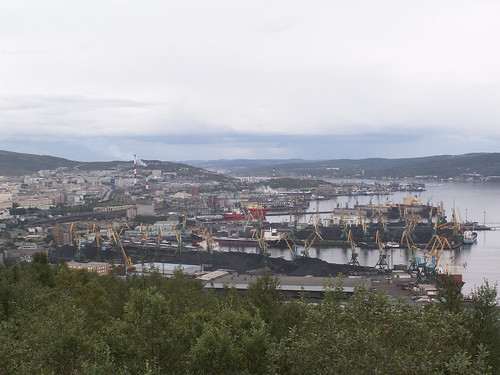
Specialized Oil-Loading Seaport Vitino captured by Russian security officials through hostage taking keeps on being a subject of carve-up and litigations by Russian and international companies.
The fate of Russian Specialized Oil-Loading Seaport Vitino located on the White Sea coast has been one of the most discussed
This case is accompanied with a chain of scandals and legal proceedings connected with a struggle for the port at the courts in
Co-owner of Vitino Seaport citizen of
In February 2012,
However, the story of Vitino Seaport lies mush deeper. It dates back to the far year of 1993 that Russian businessman Zurab Musinyan made a bold venture to build Vitino Seaport in harsh environmental conditions of the north.
Specialized Oil-Loading Seaport Vitino successfully cooperated with Russian oil-producing companies, loaded and shipped 50-80-metric-ton tankers to Europe and
That very time a story occurred, which laid the foundation of further events to become a subject of extended disputed and litigations at the courts in many countries.
The story began in
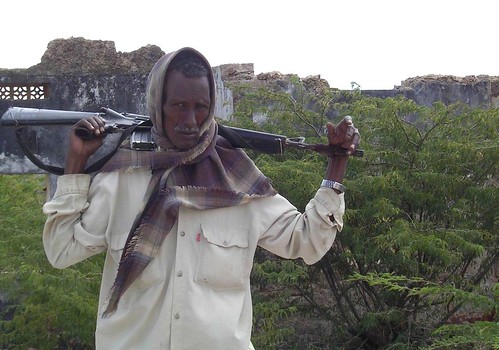
UK diplomats are investigating reports that a British man has been arrested in Somalia on suspicion of links to the Islamist rebel group al Shabaab.
The 45-year-old was held at the airport in the capital, Mogadishu, after travelling from the UK via Nairobi in Kenya, according to reports.
He is alleged to have told immigration officials he was planning to go to Kismayo in southern Somalia, a port city held by al Shabaab, which is affiliated to al Qaida.
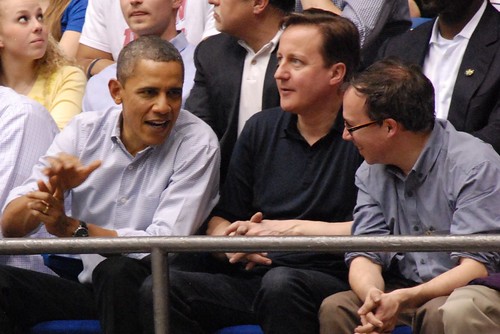
A "chuffed to bits" President Barack Obama gushed over British Prime Minister David Cameron on Wednesday, but deepening world crises conspired to darken a warm welcome for a special ally.
Obama went out of his way to hail America's "indispensable" relationship with Britain, even offering to learn the rules of cricket, gifting his guest a top of the range American grill, and laying on a sumptuous state dinner.
But both men were forced to dwell on the terrible human costs of war, with sharp questions looming about the justification for more combat in Afghanistan and the possibility of new Middle East combat over Iran's nuclear program.
Obama and Cameron
conspicuously used a joint press conference to try and convince weary American and British voters that recent sacrifices in Afghanistan had wrought "real progress" towards a future secure state.
The US leader went on the record for the first time to back NATO's planned transfer to a support role in 2013 before a full withdrawal the next year, though said there would be no sudden unscheduled drawdowns in coming months.
He also used the press conference in an unseasonably warm White House Rose Garden, with cherry blossoms in full bloom, to deliver a clear, and stiffened warning to Iran -- take new nuclear talks seriously, as time is running out.
But the elaborately choreographed event, from a 19-gun salute to Cameron to the state dinner, was about celebrating an alliance forged in war that endures.
"Through the grand sweep of history, through all its twists and turns, there is one constant: the rock-solid alliance between the United States and the United Kingdom," said Obama.
Both men quipped about the time in 1814 when the British sent a colonial army to burn down the White House.
"They made quite an impression -- they really lit up the place," Obama said.
Cameron gazed across ranks of troops in ceremonial dress on the White House lawn and joked: "You're clearly not taking any risks with the Brits this time."
Obama also lapsed into some cliche British vernacular, telling Cameron he was "chuffed to bits" to welcome him for a "good natter" and wanted to keep the US-British relationship in a "top notch" state.
After their trip to a college basketball game in Ohio on Monday, Cameron said he would get his own back by taking Obama to a cricket match, prompting a wide presidential grin.
The visit gave Obama a brief respite from the grind of a crisis-scarred presidency and allowed him to underline his credentials as a statesman as he cranks up the pace of his reelection effort.
Cameron may have enjoyed the trip even more as his coalition government is slogging through a grim period of fiscal austerity and with stagnant growth threatening to plunge Britain back into recession.

A US soldier has come out of his base in southern Afghanistan and started shooting Afghan civilians, the provincial governor said.
People were both killed and wounded in the shooting spree in Panjwai district of Kandahar province, Governor Tooryalai Wesa told reporters, though he did not provide numbers.
Nato forces spokesman Justin Brockhoff said a US service member had been detained as the alleged shooter but did not provide details on the incident.
He said the coalition had reports of "multiple wounded" but none killed. The wounded are receiving treatment at Nato medical facilities, he said.
The service member is being held at a Nato base and US forces are investigating the shooting in co-operation with Afghan authorities, Mr Brockhoff said. He said it was not clear if the alleged shooter knew the victims.
The shooting comes after weeks of tense relations between US forces and their Afghan hosts following the burning of Korans and other religious materials at an American base.
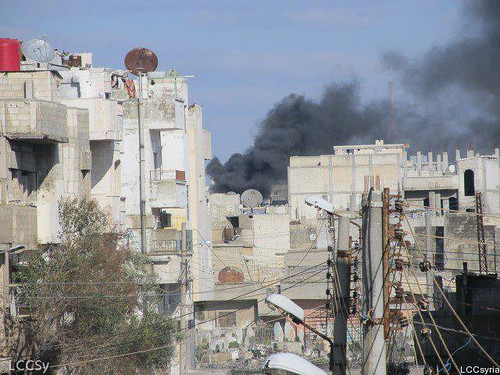
China called for an end to violence in Syria Sunday as the regime of Bashar al-Assad sparked international outrage by blocking aid from reaching the battered Baba Amr flashpoint in Homs city.
As more bloodshed was reported across Syria, Britain and Turkey joined the outcry, accusing the regime of committing a crime by barring Red Cross convoys from entering Baba Amr for the second day.
China, which twice joined Russia in blocking UN Security Council resolutions against Syria's lethal crackdown on dissent, urged all parties in Syria to "unconditionally" end the violence.
Xinhua news agency cited a foreign ministry statement attributed to an unnamed official calling for dialogue between the Syrian regime and those expressing "political aspirations."
But the official reportedly added: "We oppose anyone interfering in Syria's internal affairs under the pretext of 'humanitarian' issues.'"
As condemnation spiralled, the bodies of US reporter Marie Colvin and French photographer Remi Ochlik were flown back to Paris overnight from Damascus.
Relatives of Ochlik were there to meet his coffin as the regular Air France flight, via Amman, touched down at Charles de Gaulle airport in the French capital, an airport source said.
The two western journalists were killed in a rocket attack in the rebel Baba Amr neighbourhood of Homs on February 22.
Colvin's body was expected to be flown on to her native United States on Monday or Tuesday, according to a representative of her newspaper, The London Sunday Times.
French reporter Edith Bouvier of Le Figaro newspaper and British photographer Paul Conroy were wounded in the attack that killed their two colleagues.
Bouvier, 31, and photographer William Daniels, 34, who was not hurt in the rocket attack, have already been smuggled out of Homs by activists to Lebanon and on to Paris.
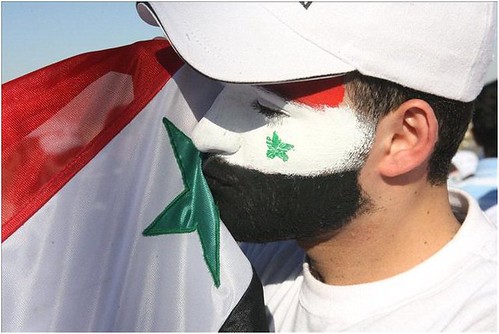
Syrian security forces on Sunday flooded a tense neighbourhood where a mourner was shot dead in the largest anti-regime rally seen in Damascus, activists said, blunting calls for a "day of defiance."
With protesters more emboldened in Damascus after 11 months of revolt which has largely escaped the city, President Bashar al-Assad's regime also came under regional pressure as Egypt joined other Arab League states in recalling its ambassador.
And the top US military officer warned on Sunday that intervention in Syria would be "very difficult" and said it would be "premature" to arm the opposition movement.
Although the security presence thwarted attempts to stage new protests in Mazzeh district, scene of a Saturday funeral that became a huge anti-regime rally, business there ground to a halt.
Mohammed Shami, a spokesman for activists in Damascus province, said most shops were shut in Mazzeh as well as in the Barzeh, Qaboon, Kfar Sousa and Jubar districts.
Student demonstrations had been expected in Mazzeh but security forces were stationed around schools, he said.
"Security forces are heavily deployed throughout Mazzeh," Shami said.
Another activist, Abu Huzaifa from the Mazzeh Committee, said police forced the family of Samer al-Khatib, 34, who died after being shot in the neck during the mass funeral on Saturday, to bury him in a small ceremony earlier than planned, in an apparent move to prevent protests.
Student protests however erupted after school in other areas of Damascus, including the districts of Al-Hajar Al-Aswad, Midan, Jubar and Barzeh, according to Shami.
In central Damascus shops opened as usual, witnesses said, while state television showed live interviews from Mazzeh with people who claimed life was normal there.
Deeb al-Dimashqi, a member of the Syrian Revolution Council based in the capital, told AFP earlier that "huge demonstrations" were expected, but added that security forces had imposed a tight clampdown.
In a message to Damascus residents on the "Syrian Revolution 2011" Facebook page, activists said: "The blood of the martyrs exhorts you to disobedience," after more than 6,000 deaths since anti-regime protests erupted in March, according to activist estimates.
Activists and official media reported at least 14 people killed on Sunday.
A "terrorist group" shot dead prosecutor Nidal Ghazal and judge Mohammed Ziyadeh and their driver in the northwestern province of Idlib, the official SANA news agency reported.
Four people, including a student, were killed and three wounded when gunmen fired on a bus in the central province of Hama, SANA said.
Security forces shot dead a woman when they stormed the town of Sukhna in Homs province as they hunted activists, the Britain-based Syrian Observatory for Human Rights said in a statement.
It also said that a man was shot dead at a checkpoint in the northern province of Aleppo.
A lawyer was shot dead as troops stormed the town of Al-Ashara in the province of Deir Ezzor, the Syrian Observatory said.
An army deserter was killed in Bab Sbaa in Homs, while three troopers were killed in a gunfight with deserters in Dael village in Daraa province, the southern cradle of dissent, the Observatory said.
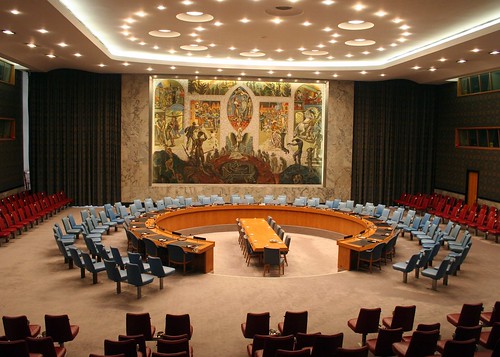
Outrage grew on Sunday after Russia and China blocked a UN Security Council resolution condemning Syria for its crackdown on protests, with the opposition saying it handed the regime a "licence to kill."
Saturday's rare double veto drew swift condemnation from world powers, with Washington saying it was "disgusted."
Russia blamed Western powers for the Security Council's failure to pass the resolution, saying they had failed to make an additional effort for consensus.
"The authors of the draft Syria resolution, unfortunately, did not want to undertake an extra effort and come to a consensus," Deputy Foreign Minister Gennady Gatilov wrote on Twitter.
The failed resolution followed widespread disgust at what the opposition Syrian National Council (SNC) labelled a "massacre" overnight Friday in the central flashpoint city of Homs and a spiralling death toll.
Activists and residents had reported more than 200 civilian deaths, including women and children, during a massive assault by regime forces there.
On the ground, activists on Sunday reported another 60 people killed in Syria, adding to the body count of one of the bloodiest weekends since the uprising against Assad's regime erupted almost 11 months ago.
Opposition groups say at least 6,000 people have now been killed in Syria since last March.
The surge of violence coupled with the second UN double veto in four months triggered a wave of international outrage at the failure to reach a common stand at the United Nations.
The SNC said in a hard-hitting statement that "Syrians and others around the world" had looked to the Security Council to issue a strongly worded resolution.
"The SNC holds both governments accountable for the escalation of killings and genocide, and considers this irresponsible step a licence for the Syrian regime to kill without being held accountable," it said of Russia and China.
US ambassador to the UN Susan Rice said Russia and China "remain steadfast in their willingness to sell out the Syrian people and shield a craven tyrant."
The veto controversy comes ahead of a Tuesday visit to Damascus by Russian Foreign Minister Sergei Lavrov and Russia's Foreign Intelligence Service (SVR) chief Mikhail Fradkov for talks with Assad.
"Russia strongly intends to achieve a rapid stabilisation of the situation in Syria through the rapid implementation of much-needed democratic reforms," the Russian foreign ministry said in a statement Sunday.

William Hague has called for a stepping up of the fight against Somali-based terrorism as he became the first British foreign secretary to visit the war-torn state for 20 years.
His arrival in the capital Mogadishu amid tight security marked the start of a major diplomatic push to bring stability to a country he described as "the world's most failed state".
Mr Hague said recent gains by the 10,000-strong African Union force in the country (Amisom) had driven back the radical Islamist group al Shabaab from the capital. But with much of the south of the country still controlled by the organisation, which has links to al Qaida, he said there must be no let-up in the pressure.
Britain is hosting a major conference on Somalia in London later this month, attended by representatives of 50 nations in international organisations. Mr Hague promised that counter-terrorism would be high on the agenda as well as tackling piracy and Somalia's deep humanitarian problems.
"One of the objectives of our conference in London is to strengthen counter-terrorism co-operation to make it easier for countries in this region to disrupt terrorist networks, to disrupt their financing and the movement of potential terrorists," he said.
In 2010, MI5 director-general Jonathan Evans warned it was "only a matter of time" before terrorists trained in Somali camps inspired acts of violence on the streets of the UK. However, ministers believe the success of the Amisom offensive last August in driving al Shabaab from Mogadishu has opened up a window of opportunity.

Pakistan on Wednesday hit out angrily at a leaked NATO report accusing its spies of secretly aiding the Afghan Taliban, saying that pre-dawn air strikes killed at least 20 local Taliban fighters.
Pakistan's alliance with the United States and NATO plummeted to an all-time low after US air strikes killed 24 Pakistani soldiers on November 26 and Islamabad has since shut its Afghan border to NATO supply convoys.
Relations with Afghanistan are also notoriously frosty over mutual blame for insurgencies plaguing both countries, but top-level talks in Kabul on Wednesday had been aimed at charting new cooperation.
But the leaked NATO document claims that Islamabad, via Pakistan's ISI intelligence agency, is "intimately involved" with the insurgency and that the Taliban assume victory is inevitable once Western troops leave in 2014.
The BBC said the report was based on material from 27,000 interrogations of more than 4,000 captured Taliban and Al-Qaeda operatives.
"Pakistan's manipulation of the Taliban senior leadership continues unabatedly," the report was quoted as saying.
Taliban captives said Islamabad was using a web of intermediaries and spies to provide strategic advice to the Taliban on fighting US and NATO troops.
Related article: Pakistan jet strike kills 20 Taliban
"This is frivolous, to put it mildly. We are committed to non-interference in Afghanistan and expect all other states to strictly adhere to this principle," Pakistani foreign ministry spokesman Abdul Basit told AFP.
A senior security official condemned the leak, as reported by the BBC, which also broadcast a documentary "Secret Pakistan" last year accusing parts of Pakistan's intelligence service of complicity with Taliban militants.
"The report is not available, leaks not worth commenting," he told AFP.



















